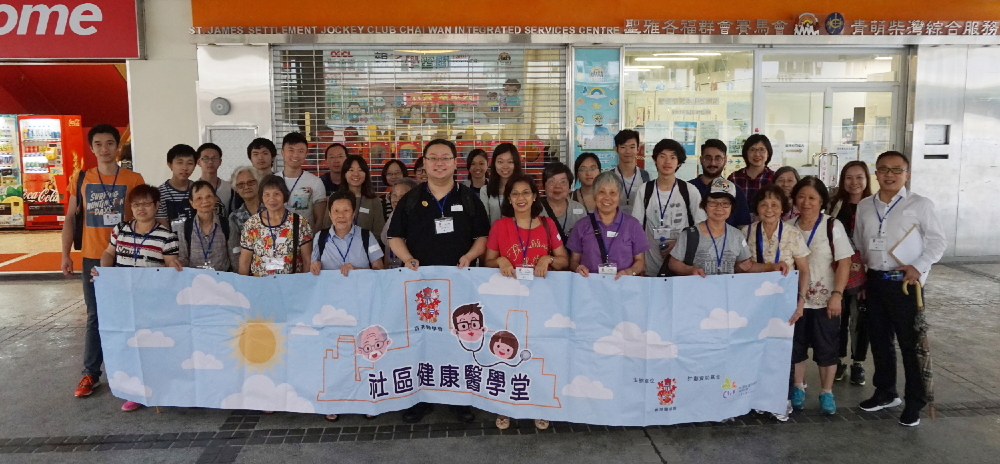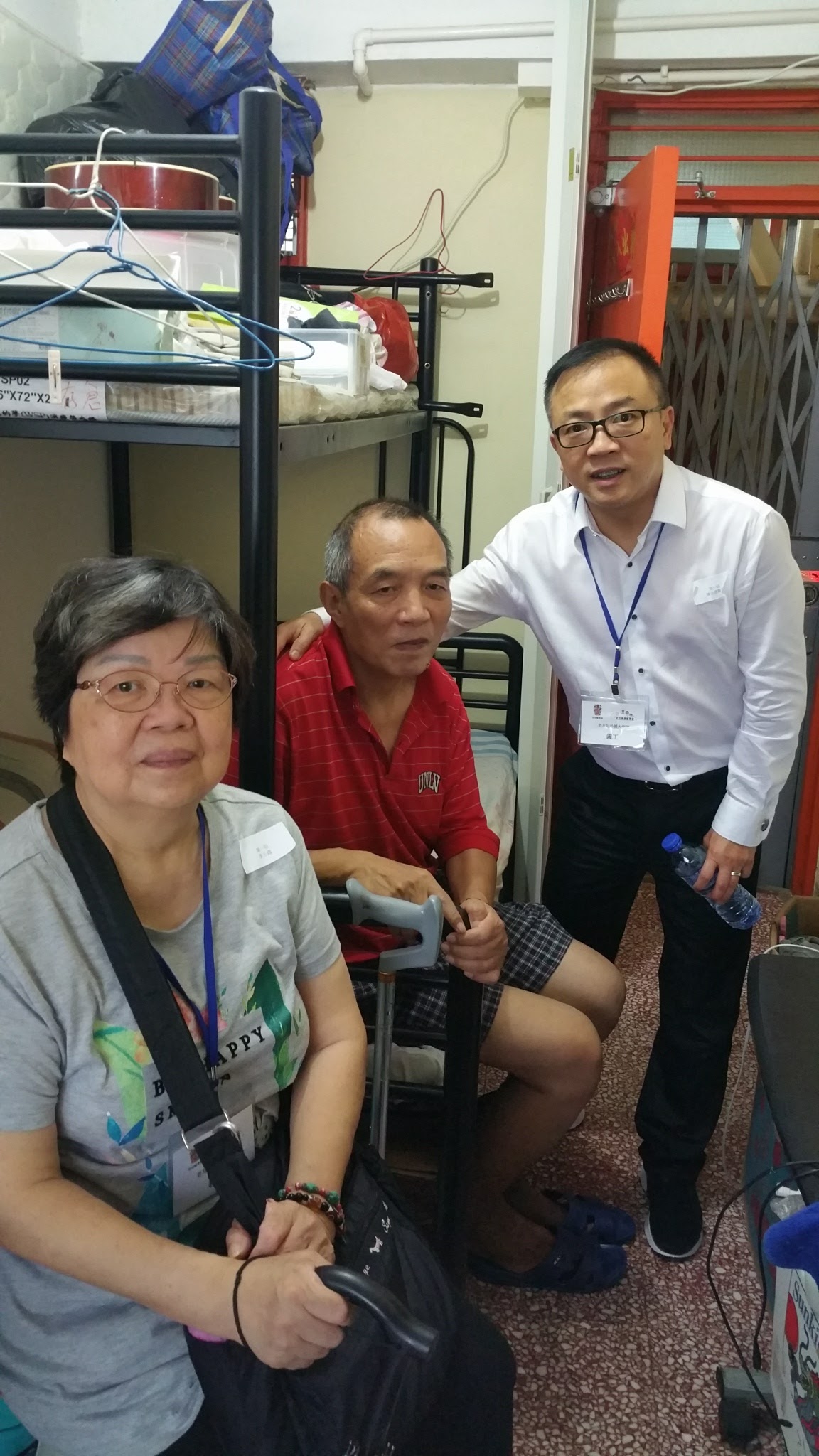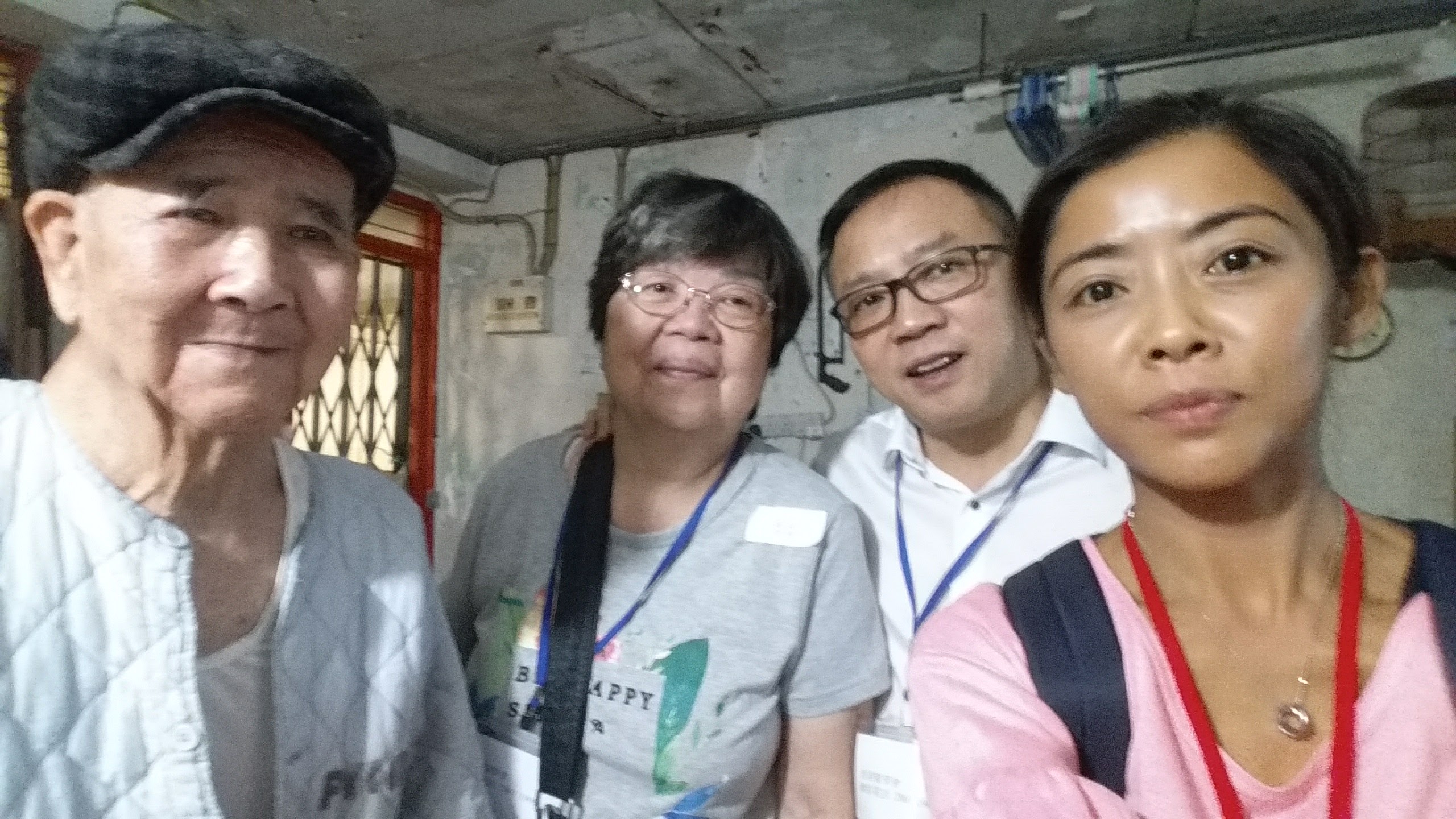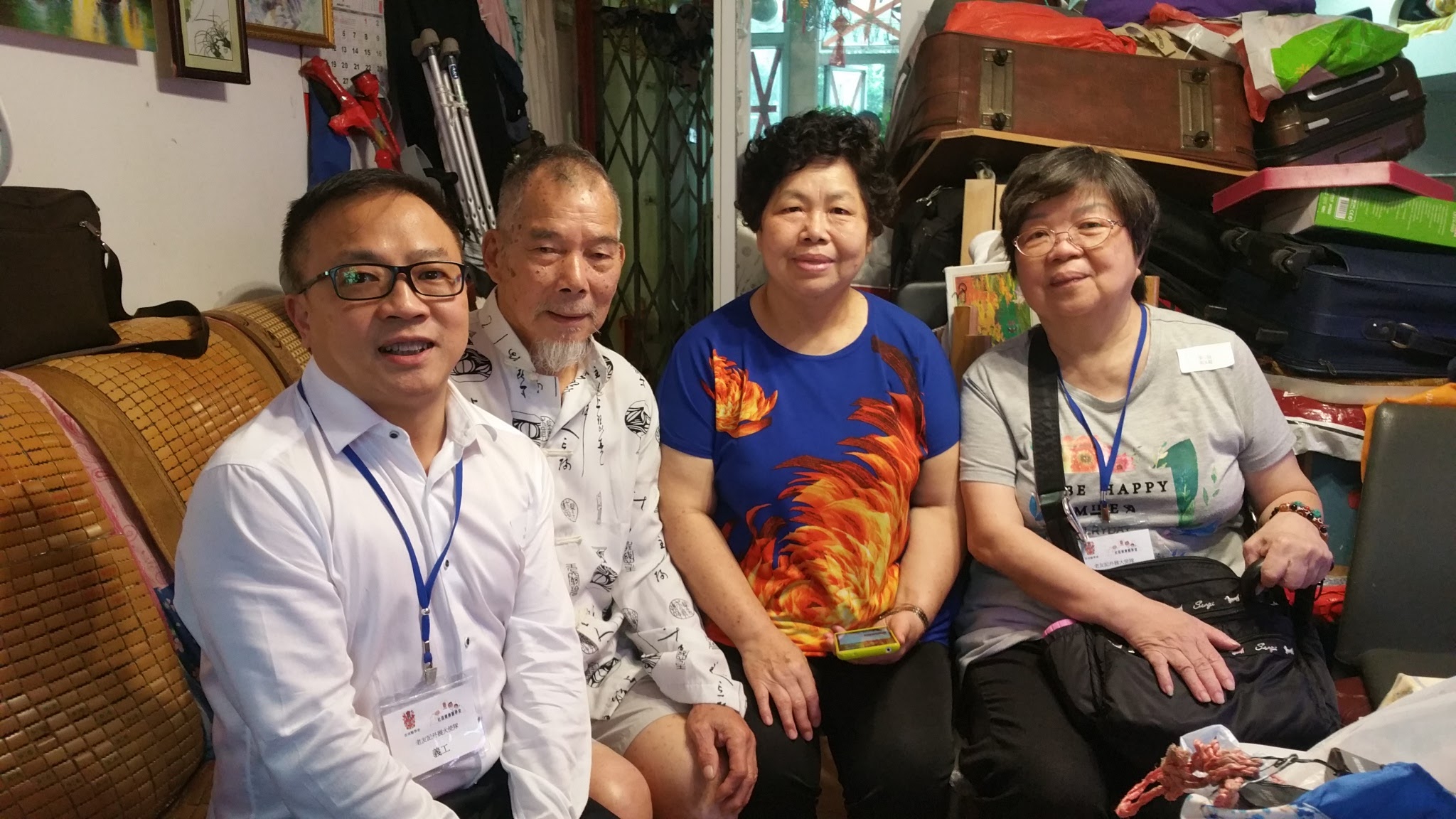© Hong Kong Academy of Medicine. CC BY-NC-ND 4.0
DOCTOR FOR SOCIETY
A bridge between community and patients:
an interview with Dr Douglas NT Chan
Apple TY Lo; Katherine Wong; Waylon WL Chan
Year 4, The Chinese University of Hong Kong
“Are you here for Dr Chan’s consultation? You can
queue up after me. He will be here soon.” Reaching
the door of Dr Douglas Nim-tak Chan’s clinic early in
the morning, we were greeted eagerly by an old lady
waiting for a flu vaccination. In a small clinic in Tai
Koo, Dr Chan is no stranger to the neighbourhood.
With a warm smile, he gently welcomed the old lady
into the waiting area, chatted with her like an old
friend and began his day. His composed and modest
demeanour cannot mask the passion Dr Chan has
for serving the vulnerable elderly people in Hong
Kong who are cast out of the media’s spotlight. He
is familiar to the people who appear in community
centres, as Dr Chan is a frequent visitor and volunteer.
As a directly elected committee member of the
Hong Kong Medical Association, he has been one
of the major driving forces behind the Community
Health Academy initiative that aims to reach out to
the elderly people in a multidisciplinary approach,
hoping to represent the general practitioners (GPs)
of Hong Kong and serve the community in the role
of doctor.
Dr Chan graduated from the University of Hong
Kong in the Class of ’86, after which he practised as a
GP for over 25 years. He currently sees cases in two
clinics, as well as delivering lectures and carrying out
health checks for the public in various community
centres in his spare time.
Stepping into community service
Over the past few decades, as the baby boomers of
the 50s and 60s in Hong Kong have aged, the number
of elderly people has risen at a staggering pace. The
community at large is ill-equipped to deal with the
social problems associated with an ageing population.
Dr Chan has given over 30 talks since 2000
covering a wide array of topics including common
mood disorders, depression and suicide, stress
management in schools, early detection and
management of dementia, and prevention of stroke
and osteoporosis. When Dr Chan first engaged in
community events a decade ago delivering health
talks aimed at the public, he noticed that these
public health events were mainly sponsored by either
pharmaceutical companies or non-governmental
organisations (NGOs). They were usually one-dimensional
in the sense that they focused on a
specific issue, such as controlling diabetes. However,
the problems faced by the audience of such talks,
targeted at the aged, were multifaceted and
sometimes intractable. Social issues ranging from
inadequate housing and food security to mental
issues caused by loneliness and a lack of purpose were
often overlooked by medical practitioners who were
trained to focus on physical ailments and treatment.
Even those who recognised the intertwining social
issues had no means to help their patients deal with
them.
This rings especially true for ‘hidden elders’
who are isolated from the outside world and often live
by themselves. Dr Chan recalled a case where he met
an aged gentleman living by himself in a public estate
in poor condition. His television had broken several
years previously and his radio set malfunctioned soon
after. As he rarely left the house, he was completely
detached from the outside world. In this case, there
was a simple solution—Dr Chan bought a battery-operated
radio for him which he received ecstatically.
His idea of starting a new project sprang from
a course he attended with other GPs 10 years ago on
hospice care organised by Pamela Youde Nethersole
Eastern Hospital; home services to patients suffering
from chronic diseases were arranged. He came to
realise that most GPs were not well-equipped to
handle the complex medical and social issues faced
by these patients. Being eager to help yet constrained
by the resources available to him as a private GP, he
kept the idea of providing holistic care close to his
heart and started various initiatives over subsequent
years.
Holistic care for the elderly people
Dr Chan believes that the way to help the vulnerable
elderly people is to involve specialists of varying
professions to work closely as a team in order to
provide all-round care that meets the actual needs of
the elderly people. To accomplish the goal, Dr Chan
and his colleagues launched the Community Health
Academy that brings together doctors and nurses,
various paramedics, NGOs, social workers, and
housing department officials. The young generations
are also involved. Medical students and secondary
students are also recruited to participate. In the
community project, elderly individuals who have
difficulty walking are evaluated by medical staff,
allocated to a more accessible apartment by housing
officials, offered checks on home safety, and visited
from time to time by NGOs. This combination is
more flexible and timely in solving the needs of each
individual elderly person.
Apart from initiating home visits with social
groups to help patients with chronic disease, he has
also been working on projects that target psychiatric
problems such as dementia. By reaching out to
different social groups and organising monthly visits,
Dr Chan is determined to offer assistance to isolated
patients in the community. From providing basic
necessities and encouraging them to open up, to
playing chess like old friends during visits, Dr Chan
and volunteers have gradually established close bonds
with them, prompted their recovery physically and
psychologically; and most importantly, allowed them
to feel warm and loved despite their illness. A special
feature of the current project is that on their website,
there is a function to directly connect to local NGOs.
This provides a link between social organisations and
patients, connecting patients in need with those who
can deliver assistance.
Extending beyond the doctor-patient relationship
Dr Chan believes that a doctor’s duties should not
be limited to only treating a patient in a doctor-patient
setting, but should also extend to public
health advocacy and speaking out on policies that
impact citizens’ health. He describes a doctor-patient
relationship as analogous to a point-to-point
connection, while advocacy is a point-to-plane
connection that has the potential to achieve much
more. Advocacy reaches a much wider audience and
can strive to shift opinion and garner support on
health care policies.
He believes that doctors, equipped with
their profession’s autonomy and knowledge, can
help patients outside of the clinic environment.
Government health care policies have great influence
on patients’ well-being, and doctors should help
shape discussion of such policies to improve the lives
of patients.
Public health advocacy can also take the form
of educating the public about a wide range of health
issues. Dr Chan has been giving a series of lectures
in various community centres aimed at the elderly people
on a variety of topics ranging from caring for those
with dementia to healthy eating. Teaching the elderly
people how to take care of themselves reduces the
burden on the health care system. He also attempts
to tackle health issues that are less recognised by the
general public.
Government policies are crucial in Hong Kong’s health care
Dr Chan notes the numerous challenges faced by
the Hong Kong medical system. One problem he
highlights is the medical staff shortage in Hong
Kong. Dr Chan believes the situation to be less
dire than it seems. There are more than 10 000
registered doctors in Hong Kong along with the
increasing quota of medical students who will be
graduating in the coming years. According to Dr
Chan, the main problem is the uneven distribution
of resources, not a manpower shortage. The best way
to solve this issue is to develop stronger connections
between local patients, private GPs, and the Hospital
Authority. Government policies that encourage such
connections can go a long way to solving the long
waiting time in public hospitals.
Another issue Dr Chan raises is the inflation
of health care costs. He recognises that medical
expenditure is a controversial issue across the world,
with debates over the Affordable Care Act in the US
to the National Health Service funding in the UK. He
recalled a patient suffering from tuberous sclerosis
personally delivering a speech to the Legislative
Council several weeks ago who complained about
skyrocketing medical costs that made better
medications unaffordable. The patient died a week
later. Even in his own clinic, Dr Chan once had a
patient who was diagnosed with leukaemia and
had to sell her flat in order to afford the targeted
therapy, despite being from a middle-class family and
working as a teacher. He sees the government as best
positioned to help these people who struggle with
medical bills, either by directly funding orphan drugs
or setting up medical insurance schemes.
Advice for medical students and young doctors
Before leaving, Dr Chan imparted some words of
wisdom for current medical students and young
doctors. He stressed the importance of getting
adequate social exposure, and the need for us to
stay connected and in touch with people in the
community. As an example, Dr Chan recalled that
last year, doctors and medical students initiated a
sit-in protest outside LegCo in the hot summer for 7
days to protest the passing of a Medical Registration
(Amendment) Bill of the Medical Council of Hong
Kong composition. As any amendment in the bill will
have significant and long-lasting impact on medical
practice in Hong Kong, these issues that determine
the landscape of the future medical profession should
be closely watched. “It is important for us to keep
abreast of local news, speaking out to fight for the
right decisions when necessary. Having more social
awareness can favour our medical practice in the
future”, Dr Chan added, with a gleam of optimism
in his eyes, reminding us of the most pivotal role of
doctors—the bridge between the community and
patients.





